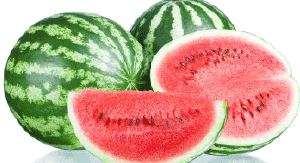Watermelon is a vine-like flowering plant that originated from southern Africa. Its fruit, which is also called watermelon, is a berry which has a thick smooth exterior and fleshy, juicy, sweet core referred to as endocarp.
In Nigeria, the watermelon fruit, gotten from the North, is considered a juicy delight with partial cookery range and nutritional value.
Despite the popular belief that watermelon is made up of only water and sugar, the fruit actually is useful and very healthy, providing a high amount of vitamins, minerals and antioxidants for a low amount of calories. Even on your salad plate, it is a suitable substitute for tomatoes. People buy Watermelon for different reasons; some buy it for a reduction in belly fat.
Reasons to take watermelon
Watermelon soothes aching muscles, according to a new study in the Journal of Agricultural Food and Chemistry, by James Seiber. Drinking watermelon juice before a hard workout help reduce athletes’ heart rate and next-day muscle soreness. This is because watermelon is rich in an amino acid called L-citrulline, which the body converts to L-arginine, an essential amino acid that helps relax blood vessels and improves blood circulation.
It contains thiamin, riboflavin, niacin, vitamin B-6, folate, pantothenic acid, magnesium, phosphorus, potassium, zinc, copper, manganese, selenium, choline, lycopene as and betaine. According to the National Watermelon Promotion Board, Orlando, USA, the fruit contains more lycopene – an anti-oxidant that is present in most fruits and vegetables – than any other fruit or vegetable.
Fruits and vegetables are linked with a reduced risk of some lifestyle-related health conditions. Many studies have suggested that increasing consumption of plant foods like watermelon decreases the risk of obesity and overall mortality, diabetes, heart disease and promotes a healthy complexion and hair, as well as lower weight.
Watermelon reduces blood pressure. According to a study published by the American Journal of Hypertension, watermelon extract supplementation reduces ankle blood pressure, brachial blood pressure and carotid wave reflection in obese middle-aged adults with pre-hypertension or stage 1 hypertension, and that watermelon extract improved arterial function.
Being an excellent source of vitamin C and other antioxidants, the fruit helps combat the formation of radicals that cause cancer. Lycopene intake, which is present in watermelon, has been linked to decreased risk of prostate cancer.
Due to the water and fibre content in watermelon, it helps to prevent constipation, adds bulk to faeces and promotes regularity for a healthy digestive tract.
It reduces and prevents inflammation. Choline is a very important and versatile nutrient in watermelon that aids our bodies in sleep, muscle movement, learning and memory. The nutrient also helps to maintain the structure of cellular membranes, aids in the transmission of nerve impulses, assists in the absorption of fat and reduces chronic inflammation.
Watermelon is used as a natural Viagra, as its improved circulation can benefit more than just the heart.
The fruit fills the belly with no irregular side-effect. It is rich in vitamins and minerals, but low in calories; so there is no fear of increased fat in the body.
With 92 per cent water and full of important electrolytes, watermelon is a fantastic fruit to have on a hot afternoon, as it reduces hydration.
It is great for the skin because it contains vitamin A, a nutrient required for sebum production that keeps hair moisturised. Vitamin A is also essential for the development of all body tissues, including skin and hair.
Eating watermelon can protect against the negative effects of macular degeneration (just a fancy word for loss of vision).













